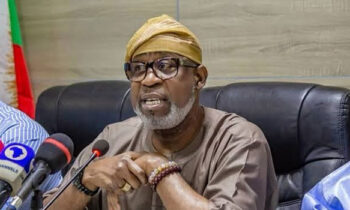Nigeria: A country full of opportunities 1
This is an extract from a book titled ‘Imagine Nigeria’ which examines the possibilities in Nigeria if necessary actions are put in place. The book involved personalities such as the vice president, Professor Yemi Osinbajo, and a host of other technocrats
Nigeria in 2021 is a country full of opportunities and in which the seeds of change that could lead Nigeria to the desired future are already present or emerging. In a world in constant flux and in which the advanced industrial nations are focused on addressing the challenges within their own borders, the present period presents Nigeria a unique opportunity.
However, if Nigeria does not rise up, as a collective, and move quickly, the future can easily be derailed by the multiplicity of existential threats and challenges which could turn the Nigerian dream into a nightmare. “In this section, he authors of the book briefly set out some of this context, which is the backdrop of the possible futures for Nigeria, and provide the basis for the recommendations we make later in this report. We look at seven areas in particular: Economy, Conflict, Infrastructure, Governance, Natural resources, Human resources, and Regional leadership.
THE ECONOMY IS IN TRANSITION
The COVID-19 pandemic has hit Nigeria when the economy was gradually recovering from the 2016 recession and, together with the sharp drop in oil prices, lockdowns, restriction of movement and disruptions to production and supply chains, it is having a knock-on effect on the Nigerian economy. The Nigerian Bureau of Statistics registered a -1.9% contraction in the country’s economy in 2020, a decline of -4.20% points when compared to the 2.27% growth recorded in 2019, as well as an inflation rate increase of 15.75% (year-on-year) in December 2020, the highest rate recorded in three years13.
The budget continues to be under severe pressure, partly because a timid economic recovery is expected during the next two years, with GDP projected by NBS to grow by only 2.45% in 2021 and 2.92% in 2022.
The economic pressures are also due to international oil prices, which should indeed be higher in 2021 compared to the pandemic-driven collapse of 2020; Oil prices are expected to stabilize around US$60/b15 till 2022. Only in 2023 is the global oil demand projected to reach its 2019 level.
State revenue collection has been severely affected by an economic recession estimated to be the worst in 40 years17. Fiscal revenues in Nigeria in 2019 were below 7%18 of GDP, compared to a world average of around 18%19. And the fundamentals do not look good, with increased healthcare costs and declining oil revenues in a context characterized by weak cash management systems and sub-optimal utilisation of available technology. While the nation continues to depend on oil, data from the National Bureau of Statistics indicates that the dependency has reduced substantially.
Between 2000 and 2019, the share of oil in total revenue declined from 83.5% to 54% (NBS). Although lower, the continued dependency on oil for revenue and foreign exchange earnings makes the country vulnerable. When government is unable to obtain enough revenue for its obligations, it must come from borrowing and that is exactly what Nigeria has been doing in recent years. In recent period, debt service payments are more than half of the annual Federal Government revenues, on average, sometimes significantly more than that.
In 2020, for instance, the debt service to revenue ratio reached 83% due to the falling oil prices. Nigeria is facing international trade deficits, explained in part by the dominant share of oil in Nigeria’s exports and the downturn in revenues from oil.
The manufacturing sector contributed around 12.82% to the economy in 2020 and is amongst the largest in Africa. As we move towards implementation of AfCTFA there is an opportunity to leverage market demand for Nigerian products. For example, the pandemic has underscored the need to further expand pharmaceutical capacities with a burgeoning market domestically and in the sub-region. Bangladesh, for example, is able to produce 97% of the national demand for medicines whereas Nigeria is still importing almost all its medicines. Challenges for the sector include inadequate power supply, the multiplicity of taxes, poor infrastructure and supply variability of rain dependent agricultural inputs. Strengths include cheap labour, high domestic demand and the fact that many of the raw materials are locally available and cheaper domestically. Improvements have included cutting down the time it takes to register a business, new grid connections for electricity, upgrading systems for imports and exports and providing tax holidays for companies producing for export. The federal government has also introduced incentives for those that can source their raw products locally and those with multiplier effects such as machine tools. On the manufacturing sector, the National Bureau of Statistics published a report in 2014 identifying opportunities and challenges
Agriculture constitutes Nigeria’s largest non-oil revenue, contributing 24.45% of GDP in 2020 and employing about 70% of the entire country’s labour force.
Agriculture generates around N37 billion across four sectors — crop production, livestock, forestry and fishing with crop production the major driver of the sector and accounting for over 89% of growth in the sector in 202031. More than 80% of farmers in Nigeria are smallholder farmers who face numerous challenges including low productivity due to lack of adoption of improved farming methods, inputs and access to credit.
These challenges are compounded by the COVID-19 pandemic due to restrictions on movement, market closures and lockdowns with devastating effects on access to inputs and farm labour. In the rainy season, disruptions to supply of seeds, fertilizer and other inputs due in large part to inadequate infrastructure could lead to further decline in domestic production, escalating an already precarious food security situation.
A 2019 McKinsey study found that the sector could be two to three times more productive, adding 20% more cereal and grain with similar increases seen in horticulture and livestock if efforts are refocused on skills development, better fertilizer use, and strengthening the elements of the agricultural value chain, including processing, setting quality standards, packaging, marketing and management.
CONFLICT IS A CONSTANT FACTOR: Poverty and inequality are among the root causes of conflict and the economic decline related to COVID-19 and other factors have fostered crime34, increased intercommunal conflicts including violent extremism and human rights violations. Nigeria has witnessed an overall increase in crime, especially in urban contexts since the beginning of the pandemic.
In the North West, banditry has surged again after the violence was partly mitigated in 2019. In the South, a high level of impunity for serious human rights violations and extortion by law enforcement and security agencies by means of illegal checkpoints continue to be a flashpoint of concern36, 37, 38. This substantially undermines the legitimacy of the state.
Instability strains the country’s resources, with one survey estimating that farmer-herder violence costs Nigeria $13bn a year.
In addition, resources were diverted to ‘hard’ security responses rather than more comprehensive, people-centred, human security interventions.
Exposed inequalities and discrimination in access to resources and perceptions of exclusion of some groups and ethnicities continue to feed into divisive rhetoric, compounded by misinformation, and hate speech, further polarizes society, thus undermining response efforts. In the medium term, it is likely the underlying drivers of conflict, criminality and insecurity will worsen.
Reported cases of Gender Based Violence have increased significantly; a threefold increase in the number of calls to domestic and sexual violence hotlines prompted The President of Nigeria to call for tough action and for governors to declare a state of emergency.
Meanwhile, the prison system is already strained with capacity at 142%42. If the economic situation worsens due to COVID-19, the prison population could increase further as crime and insecurity are aggravated.
Insurgency and banditry have resulted in a huge crisis of internal displacement, especially in the North East region of the country and on a scale not seen since the civil war of 1967 to 1970. As insecurity has persisted and the military forces have seemed incapable of containing, let alone defeating it, a loss of confidence in the ability of the state to protect citizens has continued to spread and, in some quarters, become entrenched. Spontaneous self-help measures have been organised by communities in a bid to self-protect or exact revenge, setting off a dangerous trend of lawlessness and disorder. The widespread sense among citizens of a wholesale and seemingly permanent loss of control by the government has produced many other repercussions that have been clustered under the broad rubric of demands for a sweeping restructuring of governance in the country.
THE INFRASTRUCTURE IS DEFICIENT: Nigeria’s infrastructure deficit is significant and has become a binding constraint to growth and socioeconomic development. This challenge has been recognized in national development plans.
The physical infrastructure deficit will be further compounded as the population continues to grow. The need is general from access to clean water, improved sanitation, electricity, good roads, affordable housing, ports to telecommunications, etc.
If Nigeria’s infrastructure endowment can be raised to the same level as those of the region’s middle income countries, annual growth would be boosted by about 4%. The loss of output due to inadequate energy alone is estimated at 2% of GDP while congestion due to poor port and associated transport infrastructure is estimated to have created losses of US$9.7 billion at Nigeria’s maritime logistic hubs in 2018.
Only 56% of Nigerians have access to energy (36% in rural areas and 55% in urban areas). While existing power plants have the potential to generate 12,522 megawatts (MW) of electricity, in recent news, the Transmission Company of Nigeria announced a transmission peak of 5,615 MW in March 2021, which can be attributed to the decrepit state of the network.
Housing, clean water, improved sanitation and others have not kept pace with population growth in Nigeria. The government estimates that the housing sector would need at least $400 billion investment over the next 25–30 years to resolve this deficit.
GOVERNANCE; If one thing has become clear in recent decades, it is that the major barrier to Nigeria’s flourishing is not capital (human or natural), nor ideas and creativity; it is the challenges of governance which range from corruption, weak state capacity to insecurity. Governance is particularly important given how socioeconomic challenges and institutional decay have fed a plethora of political challenges including: a resurgent ethno-regional nationalism fuelled by an intense struggle over increasingly scarce resources amidst perceptions of group and sectional favouritism; frequent and recurrent inter-communal conflicts over land and water resources, often pitching pastoralists against farming communities; growing threat of extremism; increased urban and rural insecurity taking multiple dimensions from armed robbery and kidnapping to cattle rustling and piracy; and the abandonment by some politicians of a culture of civil dialogue and its replacement by violence underwritten by bands of unemployed youth.




